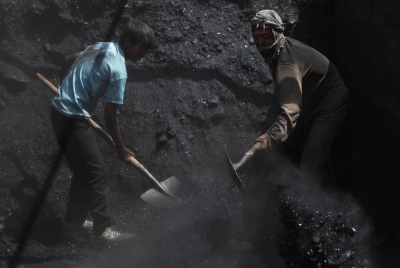Finally, Meghalaya to undertake scientific coal mining after Centre's nod
By IANS | Published: May 3, 2023 07:03 PM2023-05-03T19:03:03+5:302023-05-03T19:15:34+5:30
Shillong, May 3 In a significant development, the Meghalaya government will undertake scientific mining of coal to provide ...

Finally, Meghalaya to undertake scientific coal mining after Centre's nod
Shillong, May 3 In a significant development, the Meghalaya government will undertake scientific mining of coal to provide sustainable livelihood opportunities to the people and earn revenue for the states exchequer, officials said here on Wednesday.
An official of the Meghalaya government said that the Union Coal Ministry had last week provided approval for mining lease to four applicants of the 17 prospecting licence applicants.
He said that the income generated from the mining sector will be invested in the education and healthcare sectors for the socio-economic prosperity of the state.
The commencement of scientific mining will be a landmark in the history of Meghalaya, as it ensures minimal environmental impact through sustainable and legally compliant extraction procedures.
As part of scientific mining, reclamation of coal mining areas and use of advanced technologies, such as remote sensing, aerial surveys, and 3D modelling, would be prioritised and environmental impact would be mitigated significantly, an official statement said.
It said that initiation of scientific mining in the state is a significant achievement for the Conrad K. Sangma-led Meghalaya Democratic Alliance government, which led a long effort to provide sustainable livelihood opportunities to the people and add revenue to the state's exchequer.
In April 2014, the National Green Tribunal (NGT) had imposed a blanket ban on coal mining and transportation in Meghalaya.
The statement said that with the ruling of the NGT, the mining industry suffered a negative growth of 59.36 per cent according to GSDP at constant prices in 2014-15, thereby affecting the GSDP as a whole, to register a negative growth of 2.82 per cent.
Contraction of GSDP came as a big blow to Meghalaya's ambitions of achieving its revenue collection targets.
Apart from the impact on the economy, the ban severely crippled the lives of thousands of citizens dependent on the mining sector, both directly and indirectly. Many lost their livelihoods and had to resort to menial jobs to feed their families, the statement said.
Taking cognisance of all this, the Meghalaya government has provided much-needed impetus to revive coal mining in the state, it said.
These efforts led to the landmark judgement of the Supreme Court on July 3, 2019, upholding the rights of the people of Meghalaya over the state's natural resources.
The apex court held that private as well as community landowners have both surface rights and sub-surface rights, and minerals are owned by private and community landowners, the statement said.
In a significant step towards initiating scientific coal mining, the state government had availed the approval of the standard operating procedures for obtaining prospecting licence and mining lease for coal in March 2021.
Continuing the momentum, the Coal Ministry last week provided previous approval for mining lease to four applicants of the 17 prospecting licence applicants.
In 2014, illegal coal mining, including the more dangerous practice of rat-hole mining, was banned in Meghalaya by the NGT after terming it as 'unscientific' and 'most hazardous'.
The prohibited activities, however, continued in Meghalaya and other northeastern states despite the Supreme Court and high court's series of subsequent directions.
Environmental experts, activists and various NGOs have protested against illegal coal mining, saying that the illegal activities continued with the active support of a section of most powerful politic while the law enforcing agencies remained silent.
Rat-hole mining, an extremely unsafe practice in Meghalaya, Assam and other northeastern states, involves digging narrow tunnels, each of which fits only one person to enter and extract coal, benefiting the coal traders.
Many workers have got trapped in the illegal and unsafe mines and subsequently died, five in May/June 2021 but only three bodies were retrieved from the flooded coal mine after hectic efforts for over 27 days in East Jaintia Hills district.
In December 2018, in a major tragedy in the same district, 15 migrant miners from Assam had died inside an abandoned coal mine.
The 15 miners, whose bodies were never found, had been stuck in the coal mine at a depth of nearly 370 feet after a tunnel was flooded with water from the nearby Lytein river.
On September 18 last year, three workers of an illegal coal mine located inside a forest area on the Assam-Arunachal Pradesh border in Assam's Tinsukia district were killed after inhaling toxic gas.
The mine was operated by David Haseng, a resident of Arunachal Pradesh, who remained absconding after the incident.
Disclaimer: This post has been auto-published from an agency feed without any modifications to the text and has not been reviewed by an editor
Open in app